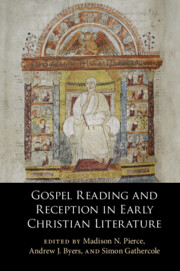Book contents
- Gospel Reading and Reception in Early Christian Literature
- Gospel Reading and Reception in Early Christian Literature
- Copyright page
- Dedication
- Contents
- Contributors
- Foreword: We Are All Gospel Readers
- Introduction
- Part I Reading the Gospel in Israel’s Scriptures
- Part II Gospel Writers as Gospel Readers
- Part III Gospel Reading as Ecclesial Tradition
- 8 Generosity without Borders
- 9 Johannine Readings of the Johannine Gospel
- 10 Severus of Antioch on Gospel Reading with the Eusebian Canon Tables
- Afterword Reading Gospels with the Gospel of Philip
- Bibliography
- Index of Ancient Sources
- Index of Modern Authors
- Index of Subjects
8 - Generosity without Borders
Reading Gospel-Commands in Early Christianity
from Part III - Gospel Reading as Ecclesial Tradition
Published online by Cambridge University Press: 27 January 2022
- Gospel Reading and Reception in Early Christian Literature
- Gospel Reading and Reception in Early Christian Literature
- Copyright page
- Dedication
- Contents
- Contributors
- Foreword: We Are All Gospel Readers
- Introduction
- Part I Reading the Gospel in Israel’s Scriptures
- Part II Gospel Writers as Gospel Readers
- Part III Gospel Reading as Ecclesial Tradition
- 8 Generosity without Borders
- 9 Johannine Readings of the Johannine Gospel
- 10 Severus of Antioch on Gospel Reading with the Eusebian Canon Tables
- Afterword Reading Gospels with the Gospel of Philip
- Bibliography
- Index of Ancient Sources
- Index of Modern Authors
- Index of Subjects
Summary
This essay will examine readings of an influential gospel motif over the first two Christian centuries. Should Christian generosity be extended to all, without condition, and should that “all” include even those who are hostile? If so, why? The chapter starts with the materials that had reached written form by the end of the first century (in Matthew 5, Luke 6, and Didache 1), focusing on the malleability of this tradition, in its various forms and with its various rationales. As a second step, it examines the pragmatics of these instructions. Starting from these three texts, but pursuing their themes into later (second-century) materials, it notes the practical difficulties regarding (a) whether this generosity is too easily abused, and (b) whether, or for how long, such generosity can be sustained. The significance of this material for the outward momentum (mission) of the church will be highlighted. As a third step, it examines the theological interpretation of these instructions, and the various ways they are connected to the character of God, or the achievement of Christ, including the ways they become integral to the “gospel.” Finally, it indicates the value of crossing the canonical boundary, the importance of reception as an active and creative phenomenon, and the theological aspects of interpretation.
Keywords
- Type
- Chapter
- Information
- Gospel Reading and Reception in Early Christian Literature , pp. 167 - 189Publisher: Cambridge University PressPrint publication year: 2022



